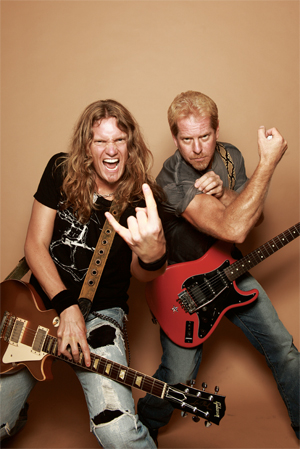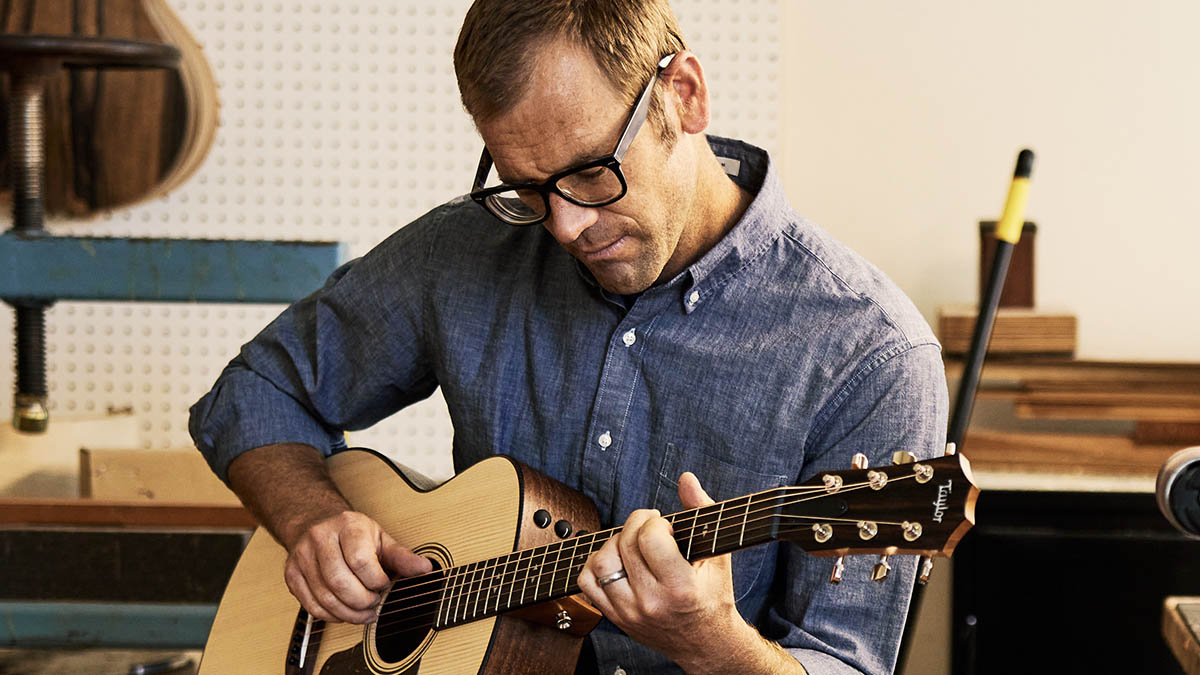Dear Guitar Hero: Night Ranger's Brad Gillis and Joel Hoekstra

One took over for Randy Rhoads after the guitarist’s untimely death, and the other can be seen on Broadway in Rock of Ages. But what Guitar World readers really want to know is…
Brad, you manipulate feedback in the solo of “Sister Christian” so fluidly. How were you able to do that? —Adam Parness
My Mesa/Boogie was key to the creation of that solo. Those amps have always helped me get the sustain I need for my personal style. I’m not a speedster player; I work off of sustain and harmonics, so we basically just had the Boogie cranked super loud, and I had a long cord going into the console room. And I could just sit there and hit a note, and there would be this loop of endless feedback. I’d just work off that and incorporate some of my whammy bar stuff.
Joel, how did you get the Night Ranger gig? —Svetlana Baiul
Kelly [Keagy, Night Ranger drummer] and I had worked together in this Eighties pick-up band in the Midwest, and we played [the Night Ranger hits] “Don’t Tell Me You Love Me,” “Rock in America” and “Sister Christian.” He was surprised when we’d do “Rock in America” and I’d actually pull off the eight-finger tapping solo. So he kind of tucked that information away. When Jeff [Watson, former Night Ranger guitarist] left the band, Reb Beach took over for a while, but he had to go back with Whitesnake, and that’s when they contacted me. They were in Japan with Reb at the time, and they gave me a list of 25 tunes to learn. I was freaking out—I had maybe 10 days to get the songs together, leads and everything. The first time I played with them, I met Brad right before we went onstage, basically. But everything went really well.
Joel, you’ve made two fusion albums and an acoustic record, and your background has more to do with classical guitar than rock. Is what you’re doing now with the Broadway show Rock of Ages and Night Ranger kind of your way of rebelling?—Kurt Mueller
Not really. Actually, these days I’m kind of back to what got me into guitar in the first place: the energy that comes from performing great rock tunes onstage. I think most players go through a phase where they’re learning things and moving away from what initially triggered their interest, but I think everyone comes back to the original reason why they started playing in the first place, and for me it’s that energy. When I play, I find myself in the mindset of Angus Young at times—just being an over-the-top showman and bringing tons of energy to the music. That’s what’s so great about playing with Night Ranger. Thesedudes throw down like it’s still 1983.
All the latest guitar news, interviews, lessons, reviews, deals and more, direct to your inbox!
Joel, how did you get involved in Rock of Ages?—Adam Parness
I moved to New York to do a show about Janis Joplin called Love, Janis. I had done something like 1,400 performances—I cut my teeth doing the theater thing. I had also done the Phil Collins show Tarzan, and the music supervisor for Rock of Ages was the keyboard player for that. So when this Eighties rock show came around, they thought I was the perfect choice. I mean, how many Broadway pit guys look like this [points to his long hair and tattered jeans]? How many of them warm up with shred guitar before playing all these show tunes? [laughs] So I was a natural fit for it, and when they found out I was playing with Night Ranger, it just kind of sealed the deal.
Brad, your whammy bar work is one of your trademarks. How, and at what point, did that become such a huge part of your playing?—Richard Sarafian
When Van Halen came out in the late Seventies I was very intrigued by the harmonic dive bomb, so I ended up getting myself a Floyd Rose. I wanted to be a little different, so I just took what Eddie Van Halen did and reversed it: I bring the bar down low first, hit the note, and then it bring it back up. All my guitars have floating bridges; you can do this on all Strats—just loosen the springs until you can bring the bar up and down. I use Big Bends Nut Sauce to help keep the strings in tune.
Joel, do you have any tips for getting started with eight-finger tapping? —Mickey Malnato
To develop your right hand, I’d recommend trilling every finger combination. Set down your index finger and just trill with your middle finger, then index-ring, then index-pinkie. Next, try planting your middle finger and trilling with your ring finger, then with your pinkie. After that, put down your ring finger and trill with your pinkie. It’s easier if you stand up, and you can even do it while you’re watching TV. It’s a great way to get started with this technique.
Brad, Night Ranger was unknown and just getting off the ground when you left to play with Ozzy after Randy Rhoads died. After you came back to the band, had your experience with Ozzy influenced your approach to Night Ranger?—Evan Caprizny
I got my stage presence together on the road with Ozzy. I’d been thrown to the wolves—I went from playing to five thousand people a night to 20 thousand a night with Ozzy. The main thing I learned was professionalism and showmanship, and of course I grew from playing Randy’s parts, as well. It was quite a learning experience and definitely the heaviest time of my life.
